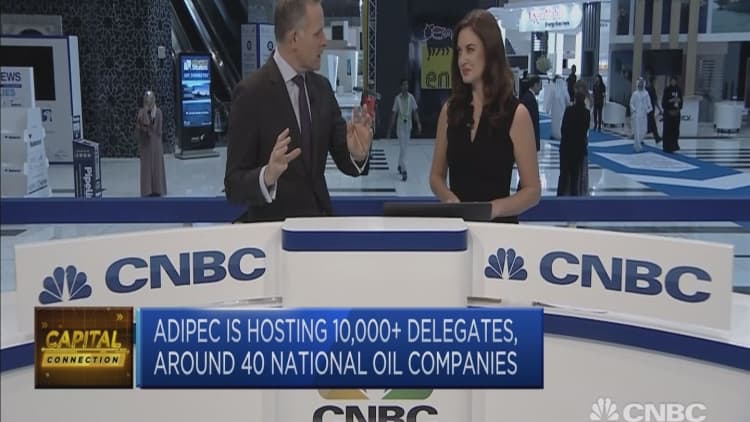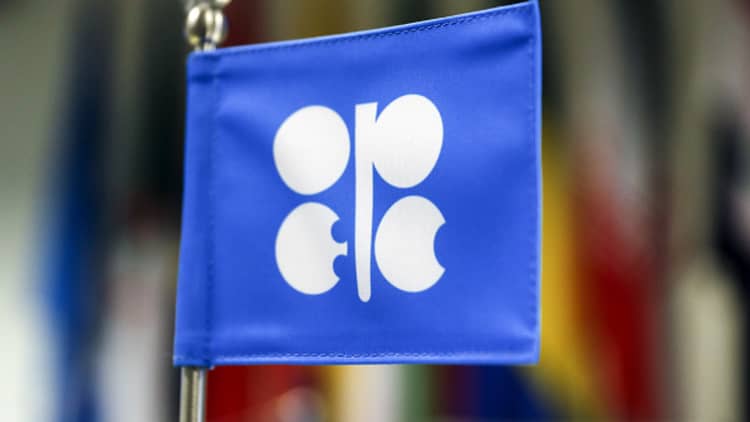
Oil prices fell to a one-year low on Tuesday, deepening a rout that has plunged the energy complex into a bear market as growing supply is poised to swamp demand next year.
The latest drop came after President Donald Trump urged OPEC and Saudi Arabia to maintain their current policy of gradually increasing output, which helps to cap oil prices. OPEC and its oil allies are mulling a fresh round of production cuts following a collapse in prices over the last six weeks.
The group could announce the new output curbs at a meeting next month, but Trump's intervention injects uncertainty into the alliance's decision-making.
U.S. West Texas Intermediate crude ended Tuesday's session down $4.24, or 7.1 percent, at $55.69, its lowest closing price since Nov. 16, 2017. Tuesday's decline extended WTI's record losing streak into a 12th consecutive session.
Brent crude fell $4.28 a barrel, or 6.1 percent, to $65.84 by 2:25 p.m. ET, after tumbling to its lowest level since March.
Both WTI and Brent have fallen more than 20 percent from their four-year highs last month, putting them in bear market territory.
The pullback began in October when crude futures fell in tandem with stocks during a broad market sell-off that saw investors shed risky assets. Signs of looming oversupply in the market have put additional pressure on oil prices.
The world's appetite for oil is still expected to surpass more than 100 million barrels per day next year, but forecasters have steadily revised their projections for demand growth lower. Even as the demand outlook weakens, OPEC and Russia have been hiking output and supplies are surging from the United States.
On Tuesday, OPEC knocked down its forecast for 2019 demand growth for the fourth time in as many months. The cartel said production increases from non-OPEC countries will outpace demand growth next year.
"The recent downward revision to the global economic growth forecast and associated uncertainties confirms the emerging pressure on oil demand observed in recent months," OPEC said.

On Sunday, a committee that represents OPEC and its oil market allies said the looming oversupply may force the alliance to consider new strategies to balance the market. The following day, Saudi Energy Minister Khalid al Falih said OPEC members agree that technical analysis points to the need for production cuts approaching 1 million bpd.
Hours later, Trump tweeted, "Hopefully, Saudi Arabia and OPEC will not be cutting oil production. Oil prices should be much lower based on supply!"
Trump has taken to Twitter several times this year to blame OPEC for rising oil prices.
OPEC, Russia and several other producers have been capping their output since January 2017 in order to balance an oversupplied oil market. The alliance agreed in June to reverse course and put more oil on the market after cutting output more deeply than the group intended.
The Trump administration pressured top OPEC producer Saudi Arabia to raise output ahead of the June meeting. The White House is relying on the Saudis to offset the impact of renewed U.S. sanctions on Iran, OPEC's third biggest producer and Riyadh's chief regional rival.

The sanctions have shrunk Iran's oil exports by about 1 million bpd and played a major part in pushing crude prices to nearly four-year highs in early October. Washington has eased some of the pressure on oil prices by issuing waivers to eight countries, which allows them to continue importing some Iranian crude over the next 180 days.
Gary Ross, CEO of Black Gold Investors, said Trump essentially "snookered" OPEC by granting the exemptions.
"Trump led them to believe the Iranian exports would be zero. It turned out they're going to be 1.2 to 1.5 million barrels a day, way higher than people thought," he told CNBC's "Squawk Box" on Tuesday.
Even as oil prices fall, emerging markets with weak currencies are still struggling to afford crude because the U.S. dollar keeps strengthening, said John Kilduff, founding partner at energy hedge fund Again Capital. Oil is sold in greenbacks, so a stronger dollar makes crude more expensive for holders of other currencies.
"They are not getting the crude oil price break that the United States is getting," Kilduff said. "The demand side of the equation is not necessarily picking up."
WATCH: Oil's losing streak



